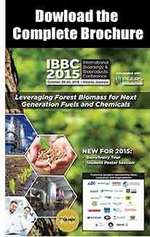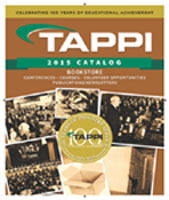A three-day course: Friday, October 30 - Sunday, November 1, 2015
Presented by TAPPI, PAPTAC and EnVertis
Complete Course Information and Course Schedule (Adobe PDF format)
Faculty Bios (Adobe PDF format)
Course Information:
The biorefinery course targets forestry company decision-making, and will address a wide range of key issues for biorefinery strategy and design. The theme of Day 1 is Advanced Biorefinery Fundamentals, the Day 2 theme is Setting Biorefinery Strategy, and the Day 3 theme is Biorefinery Techno-Economics and Case Studies. Expert instructors from across North America and Europe will share their experience, including numerous industry and other case studies.
Who Should Attend?
This is a critical time for the biorefinery development in the forestry sector – companies are at different points in setting their strategies, and any number of biorefinery product-process options are being considered. What is the best solution, and how can technologies be systematically evaluated for competitive advantage? There is no silver bullet biorefinery solution, and many questions must be addressed by companies considering successful biorefinery implementation. This course will seek to address some of these, including:
- Which biorefinery products will provide sustainably good margins over the long term?
- Which emerging biorefinery processes are the most promising for making these products?
- What are process efficiencies and operating costs today, and what might they be in 5 years from now after the process technologies have matured?
- How do we best use existing mill infrastructure when implementing the biorefinery?
- Can we implement the biorefinery, and at the same time lower the unit costs of our wood, pulp and paper products? What is the profitability of a pulp mill integrated with a biorefinery process, compared to one that is not integrated?
This course is intended for corporate personnel in forestry
companies who wish to become more knowledgeable about biorefinery
implementation strategy and design methods, as well as mill managers
and technical staff who seek to identify and select the best
biorefinery strategy at the mill level. This course will also seek to
provide knowledge for biorefinery technology providers and consultants
to assist them in understanding how biorefinery evaluations can take
place, and better understand the range of emerging biorefinery
technologies and their design/implementation in a forest company
business plan.
Course Format
The course format will encourage exchange between instructors and participants. The emphasis on the course is not to present a series of potential biorefinery technologies, however exchanges on the strengths and weaknesses of specific technology strategies will be encouraged. The biorefinery course seeks to bring together forest industry leaders and management, leading technology providers and industry consultants to share their experience in developing biorefinery strategies, in order to better understand emerging biorefinery technologies and their design/implementation within business strategies.
The TAPPI Biorefinery course is co-sponsored by PAPTAC, and is being led by Paul Stuart, NSERC Chair in Design Engineering at Ecole Polytechnique of the University of Montreal, and Principal at EnVertis Biorefinery Consultants.
The TAPPI course will be offered October 30-November 1, 2015, at the Hyatt Regency Atlanta, Atlanta, GA USA, following TAPPI's IBBC event.
Course Outline (Subject to Change)
Day 1: Advanced Biorefinery Fundamentals
Friday 30 October 2015
12h00 – 12h15 Welcome and Introductions - Paul Stuart - Ecole Polytechnique and EnVertis Consulting (Montréal QC)
12h15 – 14h00 Systematic Evaluation of the Forest Biorefinery
14h00 – 14h15 Coffee Break
14h15 – 15h00 Chemical and Physical Characterization of Wood for the Biorefinery
15h00 – 15h45 Biochemical Conversion Technology 15h45 – 16h00 Coffee Break
16h00 – 17h30 Thermochemical Conversion Technology
17h30 – 18h00 Recap and Discussion
Day 2: Setting Biorefinery Strategy
Saturday 31 October 2015
08h00 – 08h15 Agenda for the Day: Paul Stuart - Ecole Polytechnique and EnVertis Consulting (Montréal QC)
08h15 – 09h45 Evaluating Product Strategies for the Forest Biorefinery
09h45 – 10h00 Coffee Break
10h00 – 10h45 Mitigating Risk with Diversified Product Portfolios
10h45 – 11h30 Supply Chain Management for the Forest Biorefinery
11h30 – 12h15 Government Policy and Biorefining: Moving Forward with Advanced Technologies
12h15 – 13h00 Lunch
13h00 – 14h30 Biorefinery Development and Implementation
14h30 – 15h45 Evaluating Biorefinery Strategies Considering Risk and Sustainability
15h45 – 16h00 Coffee Break
16h00 – 17h30 Survey of 2012-2013 Biorefinery Start-Ups
17h30 – 18h00 Recap and Discussion
Day 3: Biorefinery Techno-Economics and Case Studies
Sunday 1 November 2015
08h00 – 08h30 Agenda for the Day, and Using Experience Curves for Risk Assessment: Paul Stuart - Ecole Polytechnique and EnVertis Consulting (Montréal QC)
08h30 – 09h15 Wood Pulping and Biorefinery Processes
09h15 – 10h00 Biobutanol from Lignocellulosics for Chemicals and Liquid Biofuels Production
10h00 – 10h15 Coffee Break
10h15 – 11h45 The LignoBoost Process
11h45 – 12h30 The LignoForce Process
12h30 – 13h30 Lunch
13h30 – 14h15 Value Prior to Pulping (VPP) - A Techno-Economic Analysis
14h15 – 15h00 Enhancement of Hot Water Extraction with the Production of Furfural, Nano Cellulose and Higher Value Lignin
15h00 – 15h45 Economics of Hardwood Biorefinery Based on Hot Water Extraction with Revenue Enhancing Products
15h45 – 16h00 Coffee Break
16h00 – 16h45 Hydroxy Acid Separation from Black Liquor
16h45 – 17h30 Project Independence: Case Study of the Strategy and Development of a Biorefinery Project
17h30 – 18h00 Recap and Discussion Panel Including Speakers of the Day








